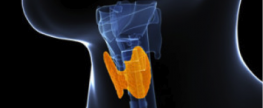
Disorders of this small gland are common, especially in older women Catherine Horvath, 51, was feeling no symptoms five years ago when her doctor ordered a routine blood test to check, among other things, how her thyroid was doing. (Your thyroid is the butterfly-shaped gland low in your neck that influences metabolism, growth and development and body temperature.) The results showed astoundingly low levels of thyroid hormone — a sign her thyroid function was, as she puts it, “pretty close to being nonexistent.” If untreated, she was at risk not only for bothersome symptoms but for other serious diseases as well. The fix was simple: One pill a day to replace the thyroid hormone she wasn’t making. Within a year, Horvath’s levels were back to normal. “It doesn’t really affect my life,” says Horvath, who lives in Santa Cruz, Calif. “I manage it by taking a pill every day.” A Common Disease Horvath is one of the estimated 24 to 28 million Americans who likely have some form of thyroid disease, many of whom develop the disorder later in life. Yet according to American Association of Clinical Endocrinologists, nearly half of those with thyroid disease don’t know they have it or are misdiagnosed. That’s because thyroid disease — particularly among older adults, when the disorders can become more common — often masquerades as other ailments. Hypothyroidism, an underperforming thyroid and the most common of thyroid diseases, may be overlooked by older people who dismiss its symptoms of fatigue, constipation, dizziness or weight gain as simply the price of getting older. An overactive thyroid, or hyperthyroidism, can look like heart rhythm problems, muscle weakness, anxiety or age-related osteoporosis. Thyroid lumps are much more common among older people, yet often can’t...


